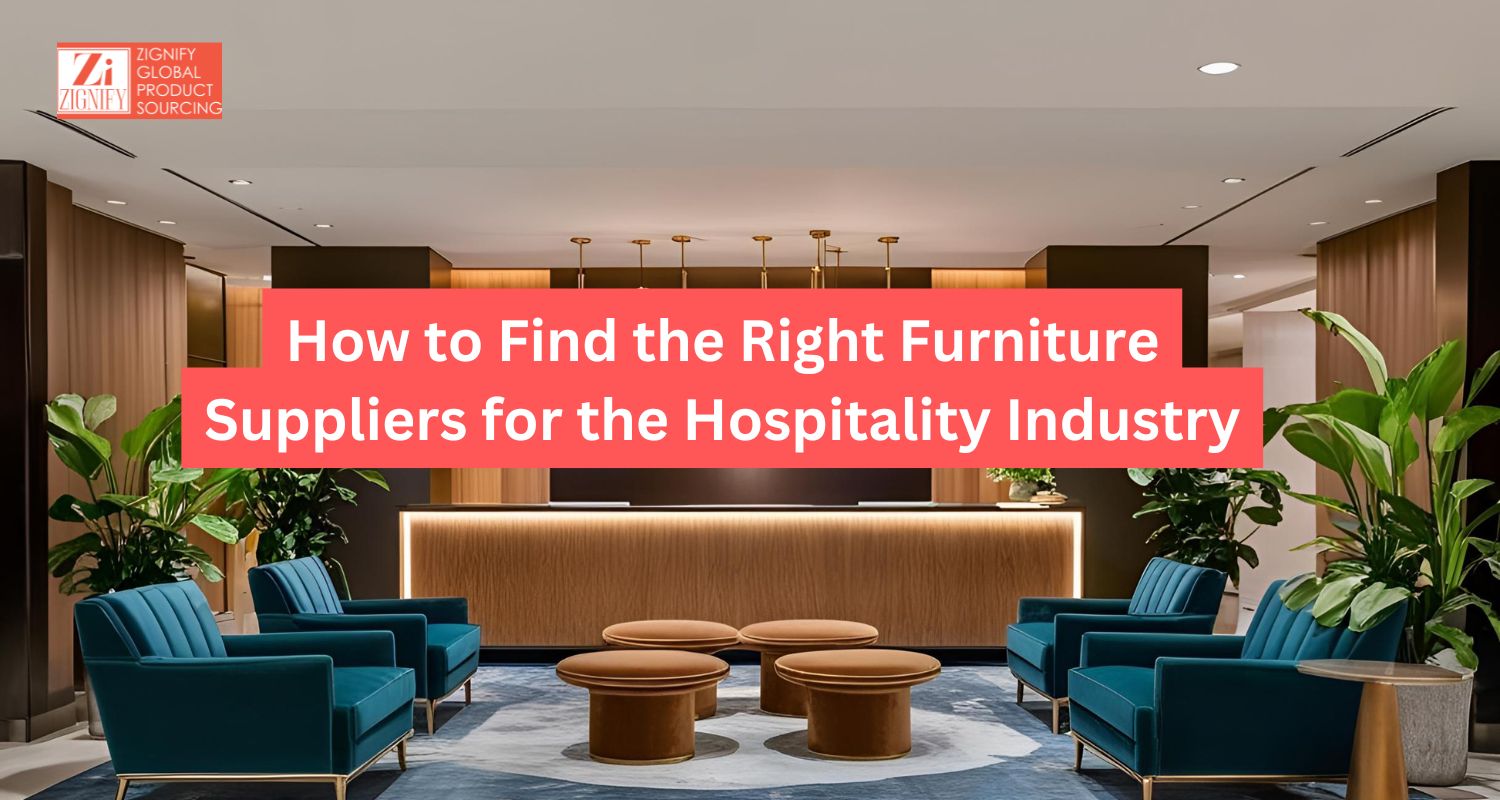Hospitality procurement is more than just buying products—it’s a strategic...
Read More
Table of Contents
Hospitality procurement is more than just buying products—it’s a strategic function that directly impacts customer satisfaction, brand consistency, and operational efficiency. In particular, furniture procurement plays a pivotal role in defining guest experience, aesthetics, and durability in hotels, resorts, and restaurants.
This guide focuses on helping you find and evaluate the right hospitality furniture suppliers, a vital step in your procurement journey.
What Are Suppliers for Hospitality Furniture?
Hospitality furniture suppliers specialize in providing furniture for hotels, resorts, restaurants, and event venues. These suppliers understand the unique requirements of the hospitality industry, including:
- Durability under heavy usage
- Customization for branding
- Compliance with fire safety and building codes
- Scalability for large-volume procurement
Supplier Category Comparison
| Supplier Name | Product Range | Lead Time | MOQ (Minimum Order) | Customization | Sustainability | Global Shipping |
| Supplier A (High-End) | Chairs, Sofas, Tables | 6 weeks | 50 units | Yes | FSC Certified | Yes |
| Supplier B (Mid-Range) | Lounge, Dining, Outdoor | 4 weeks | 30 units | Limited | Partially | Yes |
| Supplier C (Budget) | Basic Beds, Desks | 2 weeks | 10 units | No | No | No |
| Local Artisan Brand | Custom Lounges | 3–5 weeks | 5 units | Full | Local sourcing | Yes |
According to a 2023 Deloitte study, 62% of hotel guests associate comfort and ambiance with furniture quality. From ergonomic lounge chairs to premium bedframes, furniture defines your property’s first and lasting impression.
Steps in Hospitality Product Procurement
1. Define Procurement Objectives
Start with a clear vision:
- Improve aesthetics?
- Upgrade sustainability?
- Enhance guest comfort?
Define your needs vs. wants, and break them into categories like:
- Lobby & Reception
- Guest Rooms
- Dining Areas
- Outdoor Spaces
- Back-of-House
2. Create a Procurement Plan
A robust procurement plan includes:
- Budget allocation
- Timeline for installation
- Quality benchmarks
- Vendor selection criteria
- Risk assessment
🧠 Tip: Include buffer time for shipping delays or material shortages.
3. Vendor Research & Shortlisting
Evaluate hospitality suppliers based on:
- Product portfolio
- Reviews and past projects
- Delivery capabilities
- Pricing structure
- Warranty and post-sales service
4. Request for Proposal (RFP)
Send out RFPs to shortlisted vendors, requesting:
- Product catalogs
- Quotes based on volume
- Customization options
- Certifications (ISO, FSC, etc.)
Key Factors When Choosing Hospitality Furniture Suppliers
🔍 Quality & Material
High-traffic areas need:
- Scratch-resistant finishes
- Flame-retardant upholstery
- Moisture-resistant outdoor furniture
Ask for samples or visit showrooms when possible.
🎨 Customization & Branding
Many suppliers offer custom fabrics, finishes, and design touches to align with your interior theme. Example: A beach resort might require waterproof wicker chairs in oceanic tones.
📦 Lead Time & Logistics
Delays can cost money and affect customer satisfaction. Ensure the supplier can meet your launch or renovation timeline.
♻️ Sustainability Certifications
Modern procurement must prioritize environmental responsibility. Look for:
- FSC-certified wood (Forest Stewardship Council)
- GREENGUARD upholstery
- Eco-packaging
According to a Statista report (2023), 45% of consumers prefer businesses that use sustainable products.
Hospitality Procurement Trends in 2025
| Trend | Description |
| Smart Furniture | Includes USB ports, wireless charging, IoT integration |
| Circular Economy Focus | Furniture made from recycled materials or reused stock |
| Local Sourcing | Reduced carbon footprint and supports local economies |
| Modular Designs | Flexible layouts for multi-use spaces |
Common Mistakes in Furniture Procurement
- Ignoring compatibility with space dimensions
- Choosing low-cost options that lack durability
- Failing to factor in shipping, taxes, and assembly costs
- Not validating supplier credentials or past projects
Questions to Ask Potential Suppliers
- Do you offer volume-based discounts?
- What are your average delivery timelines?
- Can we customize designs and finishes?
- Do your products meet fire safety and building codes?
- What is the warranty coverage?
When it comes to hospitality procurement, choosing the right partner can make all the difference in ensuring quality, efficiency, and sustainability for your business. With over 20 years of experience, Zignify offers tailored solutions that address the unique needs of the hospitality industry. From sourcing high-quality furniture to managing complex supply chains, Zignify’s expertise ensures you get the best products, at the best prices, delivered on time. Their deep understanding of the industry’s challenges and their commitment to excellence make them the ideal partner for your procurement needs.
Book a free consultation to discover how Zignify can enhance your procurement process.
Wrapping Up: Strategic Procurement = Better Experiences
Choosing the right hospitality furniture suppliers isn’t just about aesthetics or price—it’s about long-term value, durability, and aligning with your brand’s identity. A strategic procurement process ensures that you not only furnish your space but also enhance guest satisfaction and ROI.
Frequently Asked Questions on Furniture Suppliers for the Hospitality Industry
What factors should I consider when selecting hospitality furniture suppliers?
When choosing a supplier, evaluate:
- Quality and Durability: Ensure the furniture can withstand high-traffic usage typical in hospitality settings.
- Customization Options: Look for suppliers that offer tailored designs to align with your brand’s aesthetics.
- Compliance and Safety: Verify that the furniture meets industry standards and regulations.
- Lead Times: Consider the supplier’s ability to deliver within your project’s timeline.
- Sustainability Practices: Assess the supplier’s commitment to environmentally friendly manufacturing processes.
How can I ensure that the furniture aligns with my hotel’s brand identity?
To align furniture with your brand:
- Collaborate with Designers: Work closely with designers to select pieces that reflect your hotel’s theme.
- Customize Designs: Opt for bespoke furniture that incorporates your brand’s colors, logos, and design elements.
- Maintain Consistency: Ensure all furniture across different areas of the hotel presents a cohesive look and feel.
What are the benefits of customizing hotel furniture?
Customizing furniture offers several advantages:
- Unique Design: Create distinctive pieces that set your hotel apart from competitors.
- Optimized Functionality: Tailor furniture to meet the specific needs of your spaces and guests.
- Enhanced Brand Representation: Reflect your hotel’s identity through personalized design elements.
- Potential Cost Savings: Negotiate designs and materials to fit your budget, potentially reducing long-term replacement costs.
How do I assess the quality of furniture from potential suppliers?
To evaluate furniture quality:
- Inspect Materials: Check for high-quality materials like solid wood or durable metals.
- Review Craftsmanship: Examine the construction for sturdy joints, smooth finishes, and attention to detail.
- Request Samples: Obtain samples or visit showrooms to assess the furniture firsthand.
- Seek References: Ask for testimonials or case studies from previous clients to gauge satisfaction.
What is the typical lead time for custom hospitality furniture orders?
Lead times can vary based on:
- Complexity of Design: More intricate designs may require longer production times.
- Order Quantity: Larger orders might extend the manufacturing period.
- Supplier Location: Overseas manufacturers may have longer shipping durations.Generally, custom orders can take anywhere from 8 to 16 weeks from design finalization to delivery. It’s essential to discuss timelines with suppliers to align with your project’s schedule.
How can I incorporate sustainable practices into my furniture procurement process?
To promote sustainability:
- Choose Eco-Friendly Materials: Opt for furniture made from renewable or recycled materials.
- Verify Certifications: Look for certifications like FSC (Forest Stewardship Council) indicating responsible sourcing.
- Consider Durability: Invest in high-quality, durable furniture to reduce the need for frequent replacements.
- Partner with Green Suppliers: Collaborate with manufacturers committed to environmentally friendly production methods.
What are the advantages of working with local furniture manufacturers?
Collaborating with local manufacturers offers:
- Reduced Shipping Costs and Times: Proximity can lead to faster delivery and lower transportation expenses.
- Easier Communication: Direct interaction facilitates clearer understanding of requirements and quicker adjustments.
- Support for Local Economy: Partnering locally contributes to the community and may enhance your hotel’s reputation.
How do I handle warranty and maintenance for hospitality furniture?
To manage warranty and maintenance:
- Understand Warranty Terms: Review the warranty coverage, duration, and any exclusions before purchase.
- Establish Maintenance Plans: Implement regular cleaning and upkeep routines to extend furniture lifespan.
- Keep Detailed Records: Maintain documentation of purchases, warranties, and maintenance activities for reference.
What are the current trends in hospitality furniture design?
Staying updated with design trends can enhance your hotel’s appeal:
- Sustainable Materials: Incorporating eco-friendly materials aligns with environmental considerations.
- Smart Furniture: Integrating technology, such as built-in charging stations, caters to modern guest needs.
- Local Artistry: Featuring locally crafted furniture adds unique character and supports regional artisans.
- Multi-Functional Pieces: Furniture that serves multiple purposes maximizes space and functionality.

About the Author - Sebastian Herz
This blog has been thoughtfully written by a human (Max Sinclair, Founder of Ecomtent) not generically spat out by AI. Max spent +6 years at Amazon, including working closely with the A9 teams whilst owning Browse & Catalog for the country launch of Amazon Singapore. He also studied Deep Learning Essentials at the Mila Institute for Artificial Intelligence.
Don't forget to subscribe to our newsletter
Discover our latest blogs
RFID; Is it changing the future of logistics and supply chain management? Is it still useful?
Radio Frequency Identification is the full meaning of RFID. It...
Read More


